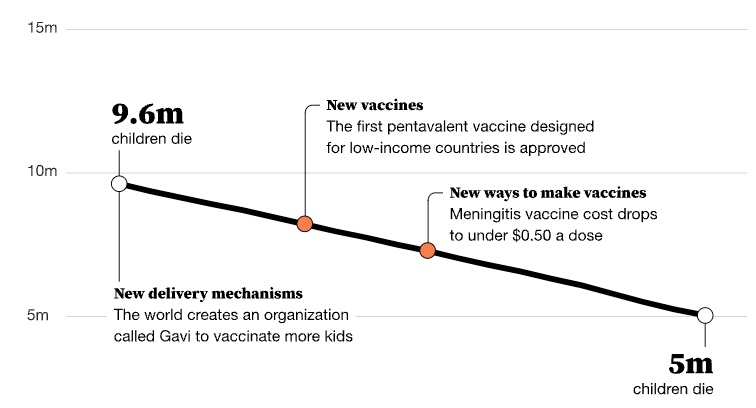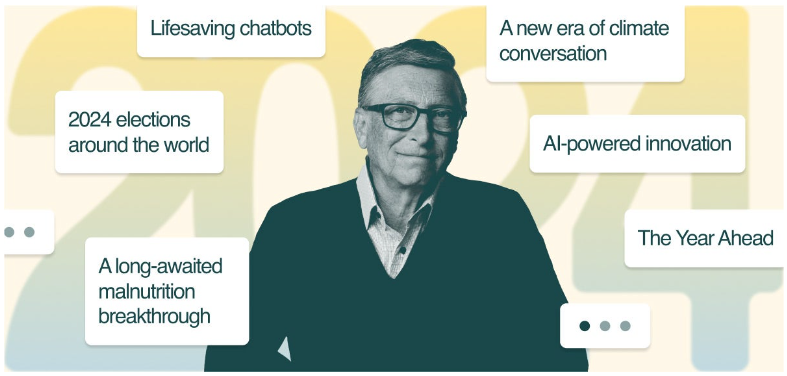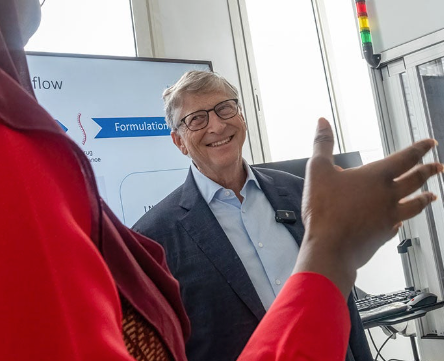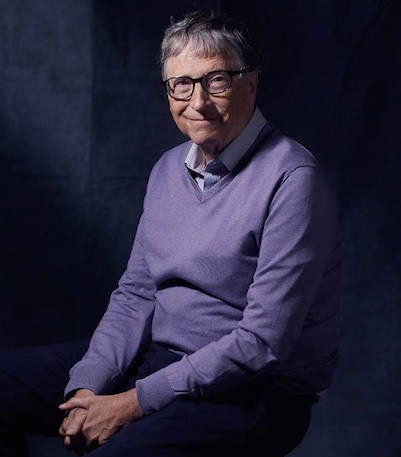The annual end-of-year letter from one of the world’s foremost tech visionaries predicts a massive wave of AI innovation in 2024 among other prognostications.
“When you think back on 2023, how will you remember it?” asks the founder and former Microsoft chairman.
“For me, this will always be the year I became a grandparent. It will be the year I spent a lot of precious time with loved ones—whether on the pickleball court or over a rousing game of Settlers of Catan. And 2023 marked the first time I used artificial intelligence for work and other serious reasons, not just to mess around and create parody song lyrics for my friends.
This year gave us a glimpse of how AI will shape the future, and as 2023 comes to a close, I’m thinking more than ever about the world today’s young people will inherit. In last year’s letter, I wrote about how the prospect of becoming a grandparent made me reflect on the world my granddaughter will be born into. Now I’m thinking more about the world she will inherit and what it will be like decades from now, when her generation is in charge.
I can begin to picture it: the tools she will use, the ways she will stay in touch with her loved ones, the problems these innovations will help solve. We now have a better sense of what types of jobs AI will be able to do by itself and which ones it will serve as a copilot for. And it’s clearer than ever how AI can be used to improve access to education, mental health, and more. It motivates me to make sure this technology helps reduce—and doesn’t contribute to—the awful inequities we see around the world. I’ve always been a firm believer in the power of innovation to offer every child an equal chance to survive and thrive. AI is no exception.
We are just at the beginning of this transition right now. This is an exciting and confusing time, and if you haven’t figured out how to make the best use of AI yet, you are not alone. I thought I would use AI tools for the foundation’s strategy reviews this year, which require reading hundreds of pages of briefing materials that an AI could accurately summarize for me. But old habits are hard to break, and I ended up preparing for them the same way I always do.
Of course, AI is far from the only defining feature of 2023. Millions continue to experience unbearable grief as a result of Russia’s war on Ukraine and in the aftermath of the war in Ethiopia. My heart is broken for the continued suffering of Israelis and Palestinians, as well as for the people of Sudan. At the same time, more people are being forced to endure hardship as a result of more frequent extreme weather events caused by climate change. And families around the world continue to be hit hard by rising inflation and slow economic growth.
That’s why I remain dedicated to making sure that, even in the face of setbacks, the world continues to do more to help the poorest people. I do the bulk of this work through the Gates Foundation, where my colleagues remain dedicated to improving global health, education, gender equality, and more. While I could write a thousand pages about the incredible work they’re doing with our partners, this letter focuses on just a few of the most exciting breakthroughs.
I also write about why I’m optimistic about the world’s climate progress. Most of my climate and energy work is done through Breakthrough Energy, although the Gates Foundation is helping people in low- and middle-income countries adapt to a warming world. I also continue to privately fund research into other areas like Alzheimer’s disease. And I still get to advise Microsoft, which gives me insight into what’s coming down the pipeline and how it can be used to make the world a more equitable place.
I’m lucky that my work gives me insight into all the ways the world is getting better. The challenges we face feel a lot less daunting when you understand what exactly it will take to tackle them. In this letter, I will share just a few reasons I am optimistic about the year ahead. I hope they make you as excited about all the progress to come as I am.”
AI is about to supercharge the innovation pipeline.
“My work has always been rooted in a core idea: Innovation is the key to progress. It’s why I started Microsoft, and it’s why Melinda and I started the Gates Foundation more than two decades ago.
Innovation is the reason our lives have improved so much over the last century. From electricity and cars to medicine and planes, innovation has made the world better. Today, we are far more productive because of the IT revolution. The most successful economies are driven by innovative industries that evolve to meet the needs of a changing world.
Gates hopes AI can address antibiotic resistance by making suggestions to health workers for “the best drug, dosage, and duration” for given local populations.
My favorite innovation story, though, starts with one of my favorite statistics: Since 2000, the world has cut in half the number of children who die before the age of five.
How did we do it? One key reason was innovation. Scientists came up with new ways to make vaccines that were faster and cheaper but just as safe. They developed new delivery mechanisms that worked in the world’s most remote places, which made it possible to reach more kids. And they created new vaccines that protect children from deadly diseases like rotavirus.”
Gates hopes AI can address antibiotic resistance by making suggestions to health workers for “the best drug, dosage, and duration” for given local populations.
- Gates Foundation is working on ways for AI to treat high-risk pregnancies from The Bronx to India and Pakistan.
- The tools include AI copilots, easy-to-use equipment for home-based ultrasounds, and a voice-enabled mobile app to help maternal health workers create medical records for people who lack them.
- Can AI bring personalized tutors to every student? Gates says “mind-blowing” tools are already available, such as Khanmigo and MATHia.
Vaccine Innovation Helped Cut Childhood Deaths in Half

“I often get asked what I would choose if I could only solve one problem. My answer is always malnutrition.”
“In the last 10 years, we have learned more about the gut microbiome than we learned in the 1,000 years before that. We’ve discovered that the bacteria living in your gut can be in a dysfunctional state that causes inflammation so you can’t absorb nutrients. And we found that you can make the biggest improvements to the gut microbiome if you intervene early.
Over the past decade, the field of child health has moved faster and further than I thought I’d see in my lifetime. It’s been amazing to watch the microbiome go from something that was completely invisible to a key strategy for tackling one of the greatest health inequities in the world. I can’t wait to see how much more we learn—and how we use that knowledge to save lives—in the year ahead.”
2024 Elections Will Shape The Future Of Global Health and the Climate.
“Accelerating innovation requires both political leadership and private sector leadership. As voters around the world decide which candidates they want to elect to fill national, state, and local offices, I think we should consider what kind of leaders can drive the innovations we need—and make sure they reach the people who need them most.
If I could make one wish for all the people headed to the polls next year—no matter where they live—it would be for them to consider electing leaders who understand the importance of investing in human development around the world. History has proven time and time again that, when governments choose to engage with and help people outside their borders, the entire world benefits.” [24×7]


















